Ernst Wahliss Austrian, 1837-1900
Lidded Jugendstil Box,
c. 1911
c. 1911
Karl Klaus for Serapis Wahliss.
13.5h x 7w inches
13.5h x 7w inches
Glazed earthenware with gilding
Further images
-
(View a larger image of thumbnail 1
)
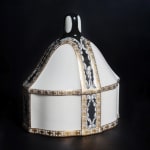
-
(View a larger image of thumbnail 2
)
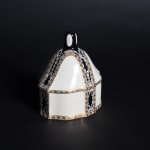
-
(View a larger image of thumbnail 3
)
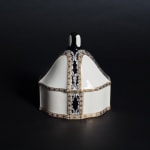
-
(View a larger image of thumbnail 4
)
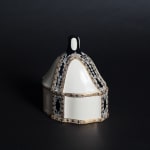
-
(View a larger image of thumbnail 5
)
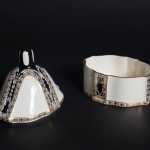
-
(View a larger image of thumbnail 6
)
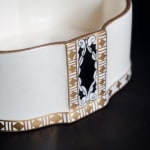
-
(View a larger image of thumbnail 7
)
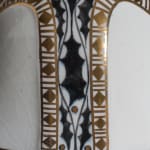
-
(View a larger image of thumbnail 8
)
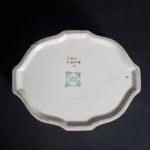
Jugendstil Porcelain Lidded Box by KARL KLAUS (1889-1925) for SERAPIS WAHLISS, Vienna, c. 1911, hand-painted in gold and black enamels in a stylized geometric diamond and holly motif, the bell-shaped...
Jugendstil Porcelain Lidded Box by KARL KLAUS (1889-1925) for SERAPIS WAHLISS, Vienna, c. 1911, hand-painted in gold and black enamels in a stylized geometric diamond and holly motif, the bell-shaped domed lid terminating in a cylindrical finial has a serpentine form which is joined at its four sides by a flat rectangular panel; the box follows the same contours as the lid; the Serapis Wahliss rectangular mark printed in green verso, the style number 9613 F impressed and F. 9613/.II.9505 06/56 painted in brown verso; measuring: 4.5 x 3.75 x 6 inches. The esteemed Viennese retailer and manufacturer of porcelain and ceramic ware, Ernst Wahliss Kunst, Porzellan und Faience Fabrik rolled out its Serapis Wahliss line in 1911. The firm had acquired 600 original models of table china from the moulds once belonging to the K.K. Austro-Hungarian factory that had closed in 1864. With new designers, like Karl Klaus, who were part of the Jugendstil movement now on board, their “luxury porcelain” designs reflected decidedly modern trends. The influence of Josef Hoffmann, Klaus’ instructor in Vienna at the Kunstgewerbeschule from 1907-1911, is apparent in the geometric patterning and reliance on a simple, but bold, palette. Klaus’ alliance to Hoffmann and his vision for elevating the applied arts to the same status as the Fine Arts continued on a professional level. The Wiener Werkstatte employed Klaus in 1911, which would remain under the directorship of Hoffmann until its demise in 1932. The scrollwork Klaus incorporated into his design on the domed lid for Serapis Wahliss demonstrates this tie to the Werkstatte and in particular a stylistic affinity to another one of it’s leading designers, Carl Otto Czeschka.







